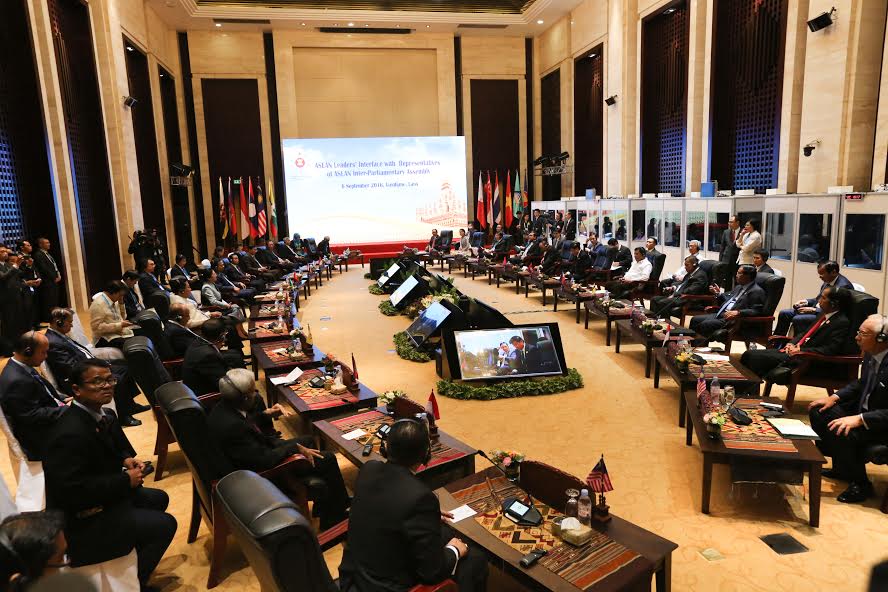South China Sea: facts on a decades-long dispute

President Rodrigo Roa Duterte joins other heads of states during the ASEAN Leaders’ Interface with representatives of ASEAN Inter-Parliamentary Assembly in Vientiane, Laos on September 6. KING RODRIGUEZ/PPD
The disputed South China Sea was in focus Wednesday at a regional summit in Laos, the first such gathering since an international court said Beijing’s artificial island building program there was “illegal.”
China claims most of the sea, even waters approaching neighboring countries, based on a vaguely defined “nine-dash-line” found on Chinese maps from the 1940s.
The Philippines and other Southeast Asian nations dispute this claim.
Commentators say the 3 million square kilometers (1.2 million square miles) of water are a potential flashpoint for regional conflict.
Here are four key questions about the sea and the issues around it.
What’s there and who’s disputing it?
It’s mostly empty — hundreds of small islets, rocks and reefs that are not naturally able to support human settlement.
Significant chains include the Paracels in the north, and the Spratlys in the south.
But everyone surrounding the sea — Vietnam, Malaysia, the Philippines, tiny Brunei, Taiwan and, most significantly, China — lay claim to at least some part of it.
If there’s nothing there, why is there any dispute?
Scientists believe the seabed could contain unexploited oil, gas and minerals, which would be a boon to any country that can establish their claims, especially in resource-hungry Asia.
It’s also home to abundant fisheries that feed growing populations.
But the sea’s key value is strategic.
Over $5 trillion in ship-borne trade passes through the waters annually, including raw materials, finished products and enormous quantities of oil.
Beijing views the South China Sea as its own backyard, a place where it is entitled to free rein and where its growing navy should be able to operate unhampered.
China also sees control of the waters as crucial to its effort to weaken American influence in the region.
How have these disputes been playing out?
For years, claimants have been building up the tiny reefs and islets to bolster their claims. China’s land-reclamation program has been particularly aggressive.
Satellite pictures now show inhabited Chinese islands where there was once only submerged coral. Many have multiple facilities, including some with runways long enough for huge planes.
Beijing insists its intent is peaceful but the US and others suspect China is trying to assert its claims and say that it could pose threats to the free passage of ships.
Washington says the waters are international and regularly sends warships there to press freedom of navigation.
China counters that these missions are provocations and warns the US not to interfere. It regularly stages its own exercises in the area as a show of force.
What was the international ruling about?
A UN-backed tribunal in The Hague ruled in July that China has no historic rights to resources in sea areas falling within the so-called “nine-dash-line.”
It was a sweeping victory for the Philippines, which filed the case in 2013.
The tribunal also found that artificial islands that China has been building over recent years do not have the 200 nautical mile “exclusive economic zone” (EEZ) enjoyed by inhabited land, effectively shrinking areas of sea that China claims.
It said China had behaved unlawfully and damaged the environment.
But Beijing has ignored the ruling, announcing penalties for “illegal” fishing in the sea and continuing its reclamation activities.
RELATED STORIES
China: Maritime row ‘should not represent’ relations to Asean
Southeast Asia’s leaders in global spotlight
US to give PH military planes—Coast Guard
RELATED VIDEOS














